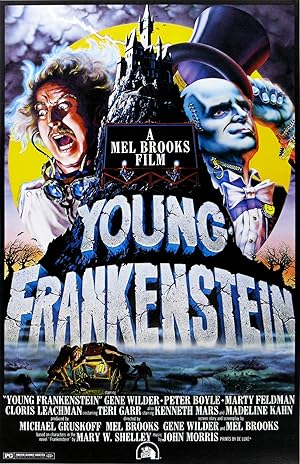Young Frankenstein
| 1974Directed by: Mel Brooks
Main Plot
Young Frankenstein follows the story of Dr. Frederick Frankenstein, a respected neurosurgeon and the grandson of the infamous Victor Frankenstein. Reluctantly returning to his ancestral home in Transylvania after the death of his grandfather, Frederick discovers his grandfather's laboratory and the dark legacy of his family's experiments. Intrigued yet horrified, he grapples with his heritage while attempting to distance himself from the monstrous reputation of his grandfather. With the help of his quirky assistant Igor and the alluring Inga, Frederick becomes increasingly drawn to the idea of reanimating the dead. He ultimately decides to recreate his grandfather's experiments, leading to the creation of a creature that is both comical and tragic. As chaos ensues, Frederick must confront the consequences of his actions and the legacy of madness that haunts his family, blending humor and horror in a satirical take on the classic Frankenstein tale.
Characters
- Dr. Frederick Frankenstein, a neurosurgeon, inherits his grandfather's castle and continues his experiments, ultimately bringing a creature to life.
- Madeline Kahn plays Elizabeth, Dr. Frankenstein's high-maintenance fiancée, whose arrival complicates his experiments and adds comedic tension to the story.
- Marty Feldman played Igor, the hunchbacked assistant who helps Dr. Frankenstein bring the monster to life, adding humor and mischief to the story.
Ending Explained
In the ending of Young Frankenstein, the story reaches its climax as Dr. Frederick Frankenstein confronts the chaos unleashed by his reanimated creature. After a series of comedic misadventures, the creature escapes and wreaks havoc in a nearby village, prompting Frederick to take responsibility for his creation. Frederick, along with his loyal assistant Igor and the spirited Inga, devises a plan to bring the creature back and restore order. The resolution occurs during a climactic confrontation at the castle, where Frederick attempts to reason with the creature. In a humorous twist, the creature displays a more human side, leading to a reconciliation of sorts. Frederick ultimately embraces his family's legacy, accepting both the creature and his own identity as a scientist. The film concludes with a celebratory dance number, symbolizing the acceptance of the creature and the blending of the two worlds—human and monster. This ending resolves the main conflict by showcasing Frederick's growth and acceptance of his heritage, while also emphasizing themes of love, acceptance, and the absurdity of life. The comedic tone throughout reinforces the film's satirical take on classic horror tropes, leaving the audience with a sense of joy and resolution.
